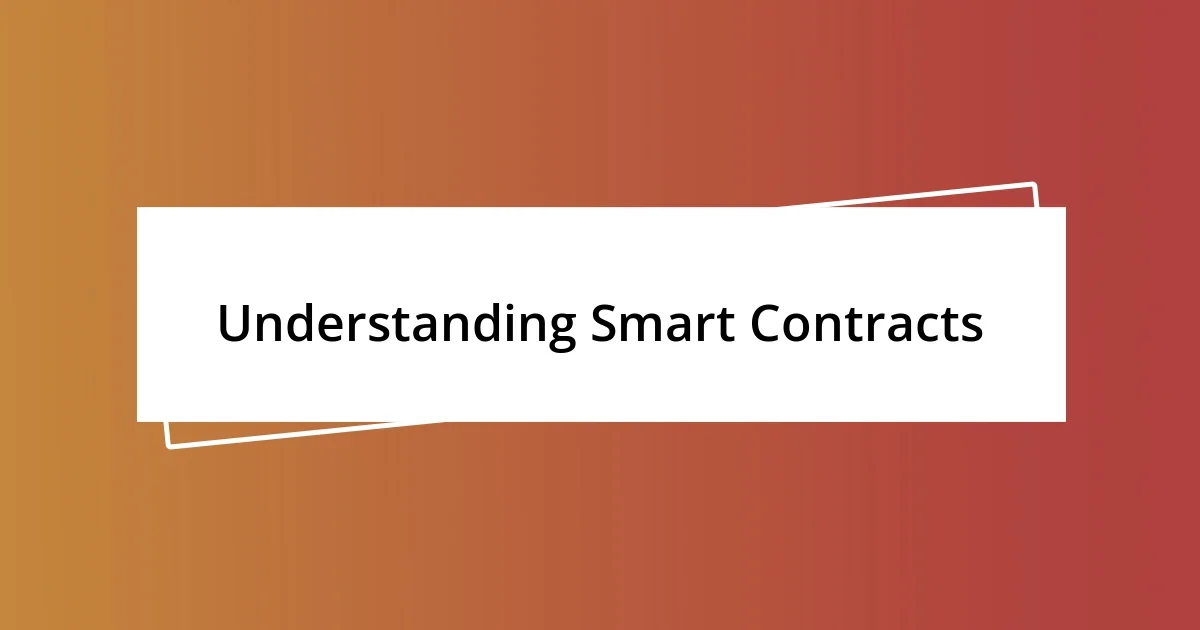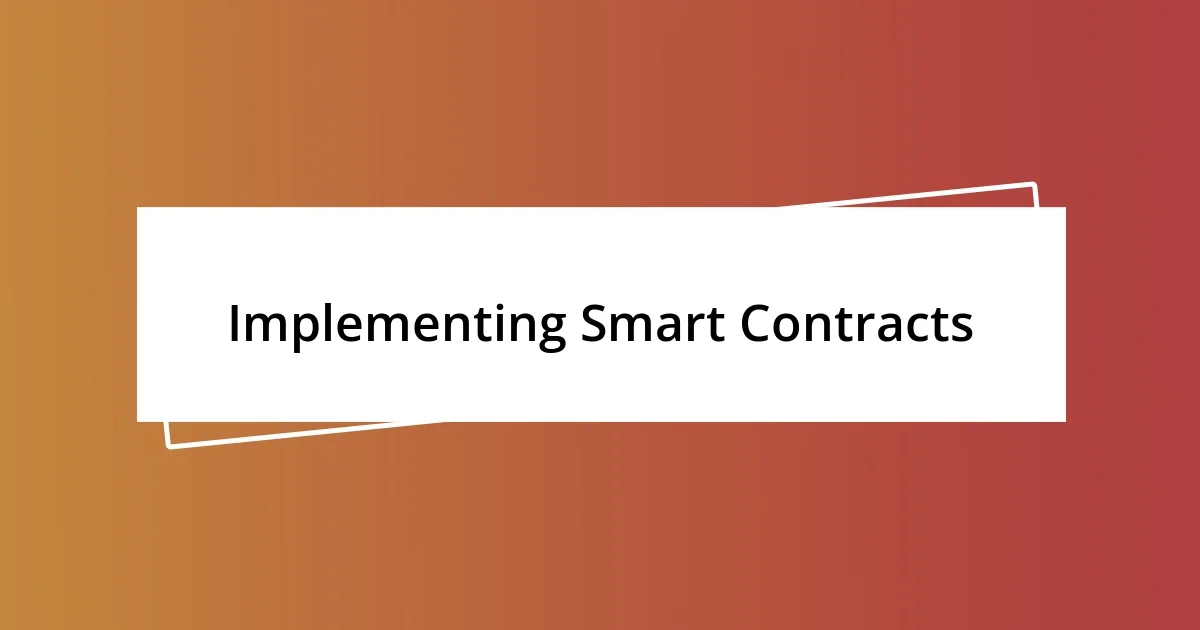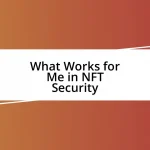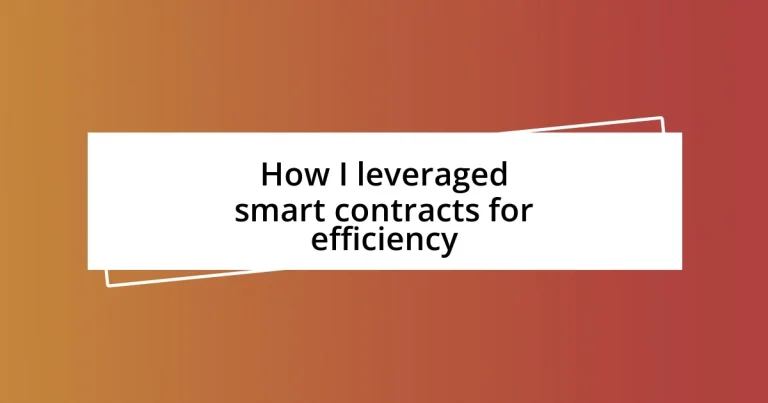Key takeaways:
- Smart contracts automate transactions on blockchain technology, enhancing efficiency, reducing costs, and increasing trust by eliminating intermediaries.
- Successful implementation of smart contracts requires careful planning, choosing the right platform, proper testing, and real-world case studies demonstrate their effectiveness across industries.
- Future trends include integrating AI for adaptive smart contracts, increasing interoperability among blockchains, and the evolution of regulatory frameworks to streamline legal compliance.

Understanding Smart Contracts
Smart contracts are self-executing contracts with the terms of the agreement directly written into lines of code. I remember when I first encountered them; it felt like stepping into the future. Could something so seemingly simple really revolutionize how we conduct transactions? As I delved deeper, I quickly realized these contracts operate on blockchain technology, which ensures transparency and security without the need for intermediaries.
What’s fascinating to me is how smart contracts automatically execute when conditions are met, eliminating the risk of misunderstandings or disputes. I recall a project where we implemented a smart contract for automatic payments to freelancers. The relief on everyone’s faces when they received their funds promptly was priceless — no more waiting weeks for checks to clear! Isn’t it amazing how this technology can streamline processes and create trust among stakeholders?
Understanding the potential of smart contracts is crucial, especially as they grow in popularity across various industries. At first, it seemed a bit intimidating — the technical jargon and concepts can be overwhelming. But as I started applying them in practical situations, my worries faded; I found that their logic mirrors everyday agreements we make. Who wouldn’t want a system that ensures everyone pulls their weight while minimizing friction?

Benefits of Smart Contracts
Smart contracts offer a transformative approach to managing agreements that many people, including myself, often underestimate. Their efficiency and automation significantly cut down on time wasted in traditional contract execution. I recall a situation where my team had to navigate a complex partnership agreement. When we switched to a smart contract model, the clarity and automatic execution of terms not only saved us time but also eliminated the usual back-and-forth that used to drain our energy.
Here are some key benefits I see in leveraging smart contracts:
- Enhanced Efficiency: Automating processes reduces the manual oversight required, speeding up execution times.
- Cost Reduction: By eliminating intermediaries like banks or lawyers, we save on fees and other costs associated with traditional contracts.
- Increased Trust: The transparency inherent in blockchain significantly diminishes the chance of fraud or contract disputes.
- Improved Accuracy: With terms coded directly in the contract, there’s less room for human error in interpretation.
- Scalability: Smart contracts can handle numerous transactions simultaneously, making them ideal for large-scale operations.

Implementing Smart Contracts
Implementing smart contracts is a strategic process that requires careful planning and understanding of the underlying technology. My experience showed me that the first step is identifying the specific use case where a smart contract could improve efficiency. For instance, I was part of a team that implemented one for a supply chain management project. The clarity it brought to roles and responsibilities transformed our workflow.
Next, we had to choose the right platform for deployment. I learned that the platform can significantly influence the contract’s capabilities and user experience. After researching, we decided on Ethereum due to its widespread adoption and robust community support, which provided us with valuable resources. It was a relief to witness how the execution of payments and tracking of goods became seamless, making the entire process less stressful.
Finally, I realized that testing and validation of the smart contract are crucial before going live. I remember spending late nights running simulations to ensure every possible scenario was accounted for. This diligence paid off; when we launched, everything worked smoothly right from the start. It’s amazing how that initial investment of time can yield significant returns in the long run.
| Aspect | Traditional Contracts | Smart Contracts |
|---|---|---|
| Execution Time | Weeks or Months | Automated, Instant |
| Involvement of Intermediaries | Common | Minimal or None |
| Cost | Higher due to fees | Lower, cost-effective |
| Transparency | Limited access | High, public ledger |

Case Studies of Smart Contracts
One fascinating case study that stands out to me involved a real estate transaction. A friend of mine sold a property using a smart contract on the Ethereum blockchain. The process was astonishingly smooth—funds were released only when all parties met their obligations. It made me wonder: how many headaches could traditional real estate deals avoid if they adopted this technology?
In another instance, I collaborated on a project related to freelance payments. By using smart contracts, we ensured that freelancers received payment immediately upon job completion. Gone were the days of waiting days for checks to clear. This not only boosted morale but also created a trustful atmosphere within the team. Can you imagine how empowering that would feel, knowing your efforts are recognized promptly?
Lastly, I’ve seen the agricultural sector harness smart contracts for quality assurance in crop sales. One farmer I spoke to shared how this technology allowed buyers to verify crop quality before payment. It seemed to build a bridge between trust and accountability seldom found in transactions. Has this newfound transparency inspired others in the industry to rethink their processes? I believe it should!

Tools for Creating Smart Contracts
When it comes to tools for creating smart contracts, I’ve had some eye-opening experiences. Initially, I dived into platforms like Solidity and Vyper, which are programming languages designed specifically for Ethereum smart contracts. I remember feeling both excited and overwhelmed by the syntax and structure. But with a bit of practice, I found it exhilarating to craft contracts that could automatically enforce the rules we set up.
One tool that made a significant difference for me was Remix IDE. This web-based development environment allowed me to write, test, and debug my smart contracts all in one place. I vividly recall the first time I successfully deployed a contract to a test network; I felt like I had just unlocked a new superpower. The immediate feedback and integrated testing features transformed my learning curve into an engaging journey.
Furthermore, I’ve explored more specialized frameworks like Truffle and Hardhat, which help streamline the development process. For example, when working on a project for automating payment processes, I utilized Hardhat’s local blockchain to simulate transactions. It was incredible to see how easily I could test different scenarios, ensuring that our users would have a flawless experience. Have you ever tried recreating an entire workflow in a controlled environment? It’s enlightening and highlights how crucial the right tools are in this journey.

Future Trends in Smart Contracts
As I look ahead, I can’t help but notice the growing interest in integrating artificial intelligence with smart contracts. Recently, I attended a conference where several speakers emphasized this synergy as the next frontier. Imagine a scenario where smart contracts could not only execute pre-defined rules but also adapt based on real-time data inputs. It felt like the future was right in front of us—how will this change the way businesses operate?
Moreover, I see a shift towards greater interoperability among different blockchain platforms. My experience tells me that as industries begin to embrace multiple blockchains, the need for smart contracts that can function across various networks will become crucial. While exploring collaborations with teams across different ecosystems, I realized that this capability could solve many existing silos, allowing for a more connected and efficient operational landscape. Isn’t it exciting to think about the endless possibilities this could offer in terms of collaboration and value creation?
Lastly, the push for regulatory clarity around smart contracts will undoubtedly shape their future. In my discussions with legal experts, it was fascinating to consider how regulatory frameworks might evolve to embrace these digital agreements. I recall a particularly insightful conversation where we pondered whether future smart contracts would integrate compliance checks automatically. Could this mean smoother operations with fewer legal disputes? I truly believe this kind of evolution could redefine trust in business transactions.














